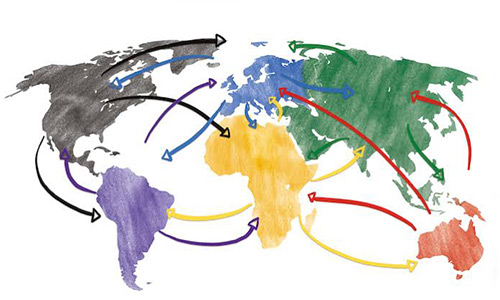In today’s world globalisation, liberalisation and privatisation is gaining growing attention as a strategy for survival, competition and growth. True economic globalisation involves a qualitative shift towards a system based on a consolidated global market place for production, distribution and consumption rather than on autonomous national economies. The compression of time and space triggered by the Third Industrial Revolution–roughly, since 1980–has changed our interactions with the international environment.
Its Dark Sides
The current position and dark side of globalisation has reminded us the capitalist mode of production which always maintained a global reach whether in the form of colonies or as trading partners across the continents. The inherent logic of capitalist economic system pushes it towards borderless economic transactions and is characterised as ‘centralisation–cum–globalisation of finance capital’. This is the epoch of finance capital and of monopolies and we are in a phase of imperialism-led-globalisation. The finance capital operates in the context of unity among the finance exporting leading capitalist countries in which every recipient country of this finance capital operates under a common sword of democles wherein foreign investments can be withdrawn without a moment notice to the recipient of such a finance. It proves the volatility of movement of finance capital and its most disastrous implication is that capital market of any country of the South can be destabilised by the investors who want quick and immediate profits and returns on investments. Joseph Stiglitz, an insider of the World Bank, published a seminal work on Globalisation and its Discontents (2002) in which he warned about the disastrous consequences of the present stage of capitalist globalisation. His brief description clearly indicated that national economy which is controlled and guided by a national state has been replaced and displaced by united globalisation capitalism.
Growing disparity in society
Under globalisation the movement of people remains tightly restricted. The flow of capital is highly asymmetrical. Over the last two decades, overseas development assistance from the rich to poor countries has totalled $ 50-80 billion per year. In the same period, every year, $ 500-800 billion of illegal funds have been sent from the poor to rich countries. That is, for every one dollar of aid money over the table the West gets back $ 10 under the table. The benefits and costs of linking and delinking are unequally distributed. Industrialised countries are mutually interdependent; developing countries are largely independent in economic relations with one another; and developing countries are highly dependent on industrialised countries. In addition there is also a growing divergence in income levels between countries and peoples, with widening inequality among and within nations. Assets and incomes are more concentrated. Wage shares have fallen. Profit shares have risen. Capital mobility alongside labour immobility has reduced the bargaining power of organised labour. Professor Paul Krugman has admitted in his book The Return of Depression Economics that technical change and globalisation have increased the demand for highly skilled workers in the US while reducing the demand for the less skilled. He said that inequality of both wealth and income has increased to levels not seen before since real wages actually declined for many workers.
Exploitative Strategy in new form
In many traditional societies agriculture is not considered merely as an occupation but a major source of livelihood and for the vast majority a way of life. The traditional relationship between the people, land and agriculture has emotive overtones and any careless tampering with this delicate subject could unleash waves of violence and social disruption. Its direct result is the increase of insecurity of individuals, groups and nations in various domains–economic, financial, culture, employment, legal, social, health care, ecological, political and personal. And this is why the concept of globalisation is encountering resistance from various interest groups–environmentalists, labour leaders, cultural traditionalists, religious leaders of different persuasions and non–government officers. This apart, the influential international NGOs have been against multinationals and the fast pace of globalisation that they have triggered. They have also come to form an international civil society because national governments no longer have a monopoly on information and because civil society now has access to data on the workings of multinationals and governments around the world.
The new system of capital finance and the ideology of ‘roll-back the state’ which allows market forces and private domestic and global operators to manage the economy in society has a definite impact on social life of the country. Since, every capitalist society is class–divided, a socially disastrous impact of such social divisions is felt very acutely on the majority of peasant and working classes in poor developing countries especially if economy in such societies is handed over to domestic and external private capitalists. The scholars–James K. Galbraith and John Williamson have also criticised the new global economic policy. Galbraith observed that ‘rising inequality after 1980 is the rule’ and stated, ‘The patterns strongly suggest that forces of globalisation, including high global interest rates, debt crisis, and shock liberalisation are associated with rising inequality in pay structures. John Williamson has also lamented that the ‘Washington Consensus’ as a policy manifesto of the New Age ‘omitted a concern for income distribution’. In the circumstances so long as there exists in the world poverty, strife, injustice and oppression, conditions will exist which terrorists can turn to their advantage. No doubt that the campaign against terrorism is one that must be mounted at various levels, including political, economic and humanitarian.
Home » Opinion » All is not Well Under Globalisation
All is not Well Under Globalisation
| Dr. Rajkumar Singh

